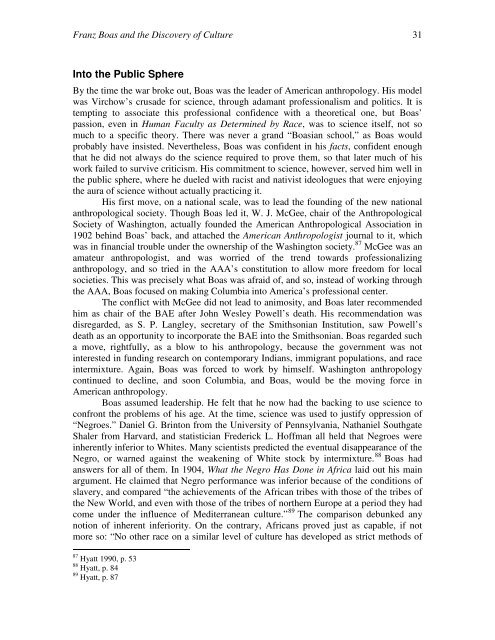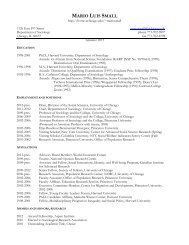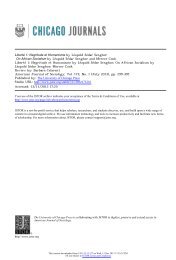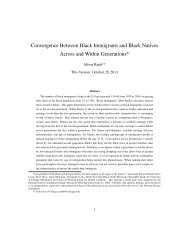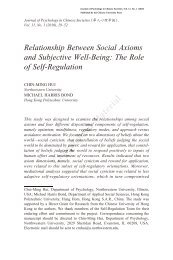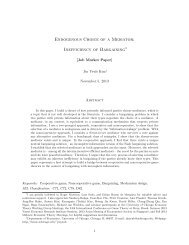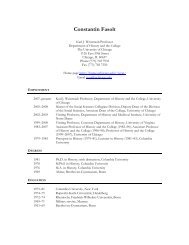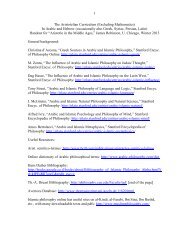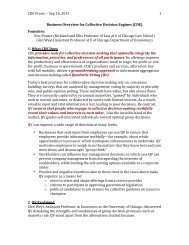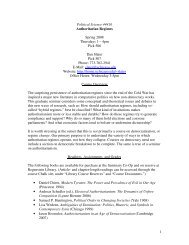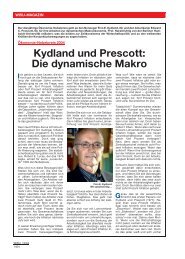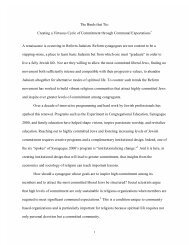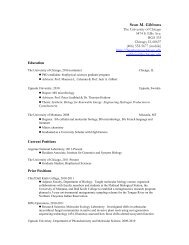Franz Boas and the Discovery of Culture - Personal Web Pages ...
Franz Boas and the Discovery of Culture - Personal Web Pages ...
Franz Boas and the Discovery of Culture - Personal Web Pages ...
Create successful ePaper yourself
Turn your PDF publications into a flip-book with our unique Google optimized e-Paper software.
<strong>Franz</strong> <strong>Boas</strong> <strong>and</strong> <strong>the</strong> <strong>Discovery</strong> <strong>of</strong> <strong>Culture</strong> 31<br />
Into <strong>the</strong> Public Sphere<br />
By <strong>the</strong> time <strong>the</strong> war broke out, <strong>Boas</strong> was <strong>the</strong> leader <strong>of</strong> American anthropology. His model<br />
was Virchow’s crusade for science, through adamant pr<strong>of</strong>essionalism <strong>and</strong> politics. It is<br />
tempting to associate this pr<strong>of</strong>essional confidence with a <strong>the</strong>oretical one, but <strong>Boas</strong>’<br />
passion, even in Human Faculty as Determined by Race, was to science itself, not so<br />
much to a specific <strong>the</strong>ory. There was never a gr<strong>and</strong> “<strong>Boas</strong>ian school,” as <strong>Boas</strong> would<br />
probably have insisted. Never<strong>the</strong>less, <strong>Boas</strong> was confident in his facts, confident enough<br />
that he did not always do <strong>the</strong> science required to prove <strong>the</strong>m, so that later much <strong>of</strong> his<br />
work failed to survive criticism. His commitment to science, however, served him well in<br />
<strong>the</strong> public sphere, where he dueled with racist <strong>and</strong> nativist ideologues that were enjoying<br />
<strong>the</strong> aura <strong>of</strong> science without actually practicing it.<br />
His first move, on a national scale, was to lead <strong>the</strong> founding <strong>of</strong> <strong>the</strong> new national<br />
anthropological society. Though <strong>Boas</strong> led it, W. J. McGee, chair <strong>of</strong> <strong>the</strong> Anthropological<br />
Society <strong>of</strong> Washington, actually founded <strong>the</strong> American Anthropological Association in<br />
1902 behind <strong>Boas</strong>’ back, <strong>and</strong> attached <strong>the</strong> American Anthropologist journal to it, which<br />
was in financial trouble under <strong>the</strong> ownership <strong>of</strong> <strong>the</strong> Washington society. 87 McGee was an<br />
amateur anthropologist, <strong>and</strong> was worried <strong>of</strong> <strong>the</strong> trend towards pr<strong>of</strong>essionalizing<br />
anthropology, <strong>and</strong> so tried in <strong>the</strong> AAA’s constitution to allow more freedom for local<br />
societies. This was precisely what <strong>Boas</strong> was afraid <strong>of</strong>, <strong>and</strong> so, instead <strong>of</strong> working through<br />
<strong>the</strong> AAA, <strong>Boas</strong> focused on making Columbia into America’s pr<strong>of</strong>essional center.<br />
The conflict with McGee did not lead to animosity, <strong>and</strong> <strong>Boas</strong> later recommended<br />
him as chair <strong>of</strong> <strong>the</strong> BAE after John Wesley Powell’s death. His recommendation was<br />
disregarded, as S. P. Langley, secretary <strong>of</strong> <strong>the</strong> Smithsonian Institution, saw Powell’s<br />
death as an opportunity to incorporate <strong>the</strong> BAE into <strong>the</strong> Smithsonian. <strong>Boas</strong> regarded such<br />
a move, rightfully, as a blow to his anthropology, because <strong>the</strong> government was not<br />
interested in funding research on contemporary Indians, immigrant populations, <strong>and</strong> race<br />
intermixture. Again, <strong>Boas</strong> was forced to work by himself. Washington anthropology<br />
continued to decline, <strong>and</strong> soon Columbia, <strong>and</strong> <strong>Boas</strong>, would be <strong>the</strong> moving force in<br />
American anthropology.<br />
<strong>Boas</strong> assumed leadership. He felt that he now had <strong>the</strong> backing to use science to<br />
confront <strong>the</strong> problems <strong>of</strong> his age. At <strong>the</strong> time, science was used to justify oppression <strong>of</strong><br />
“Negroes.” Daniel G. Brinton from <strong>the</strong> University <strong>of</strong> Pennsylvania, Nathaniel Southgate<br />
Shaler from Harvard, <strong>and</strong> statistician Frederick L. H<strong>of</strong>fman all held that Negroes were<br />
inherently inferior to Whites. Many scientists predicted <strong>the</strong> eventual disappearance <strong>of</strong> <strong>the</strong><br />
Negro, or warned against <strong>the</strong> weakening <strong>of</strong> White stock by intermixture. 88 <strong>Boas</strong> had<br />
answers for all <strong>of</strong> <strong>the</strong>m. In 1904, What <strong>the</strong> Negro Has Done in Africa laid out his main<br />
argument. He claimed that Negro performance was inferior because <strong>of</strong> <strong>the</strong> conditions <strong>of</strong><br />
slavery, <strong>and</strong> compared “<strong>the</strong> achievements <strong>of</strong> <strong>the</strong> African tribes with those <strong>of</strong> <strong>the</strong> tribes <strong>of</strong><br />
<strong>the</strong> New World, <strong>and</strong> even with those <strong>of</strong> <strong>the</strong> tribes <strong>of</strong> nor<strong>the</strong>rn Europe at a period <strong>the</strong>y had<br />
come under <strong>the</strong> influence <strong>of</strong> Mediterranean culture.” 89 The comparison debunked any<br />
notion <strong>of</strong> inherent inferiority. On <strong>the</strong> contrary, Africans proved just as capable, if not<br />
more so: “No o<strong>the</strong>r race on a similar level <strong>of</strong> culture has developed as strict methods <strong>of</strong><br />
87 Hyatt 1990, p. 53<br />
88 Hyatt, p. 84<br />
89 Hyatt, p. 87


